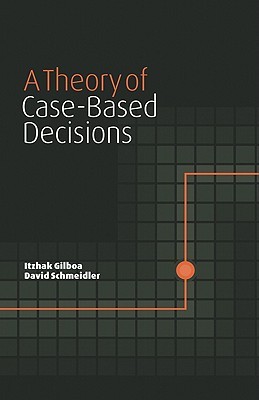
- We will send in 10–14 business days.
- Author: Itzhak Gilboa
- Publisher: Cambridge University Press
- ISBN-10: 0521003113
- ISBN-13: 9780521003117
- Format: 14 x 21.6 x 1.2 cm, softcover
- Language: English
- SAVE -10% with code: EXTRA
Reviews
Description
Gilboa and Schmeidler provide a new paradigm for modeling decision making under uncertainty. Case-based decision theory suggests that people make decisions by analogies to past cases: they tend to choose acts that performed well in the past in similar situations, and to avoid acts that performed poorly. The authors describe the general theory and its relationship to planning, repeated choice problems, inductive inference, and learning. They highlight its mathematical and philosophical foundations and compare it to expected utility theory as well as to rule-based systems.
EXTRA 10 % discount with code: EXTRA
The promotion ends in 19d.05:21:29
The discount code is valid when purchasing from 10 €. Discounts do not stack.
- Author: Itzhak Gilboa
- Publisher: Cambridge University Press
- ISBN-10: 0521003113
- ISBN-13: 9780521003117
- Format: 14 x 21.6 x 1.2 cm, softcover
- Language: English English
Gilboa and Schmeidler provide a new paradigm for modeling decision making under uncertainty. Case-based decision theory suggests that people make decisions by analogies to past cases: they tend to choose acts that performed well in the past in similar situations, and to avoid acts that performed poorly. The authors describe the general theory and its relationship to planning, repeated choice problems, inductive inference, and learning. They highlight its mathematical and philosophical foundations and compare it to expected utility theory as well as to rule-based systems.


Reviews